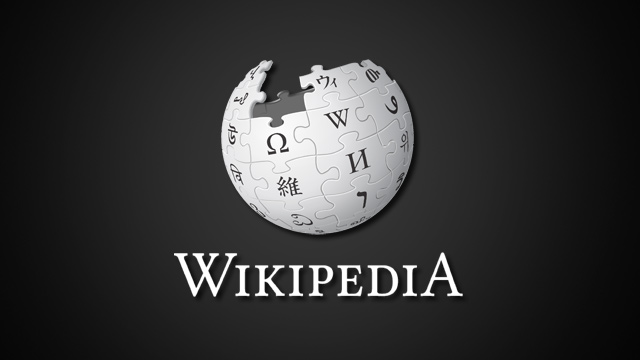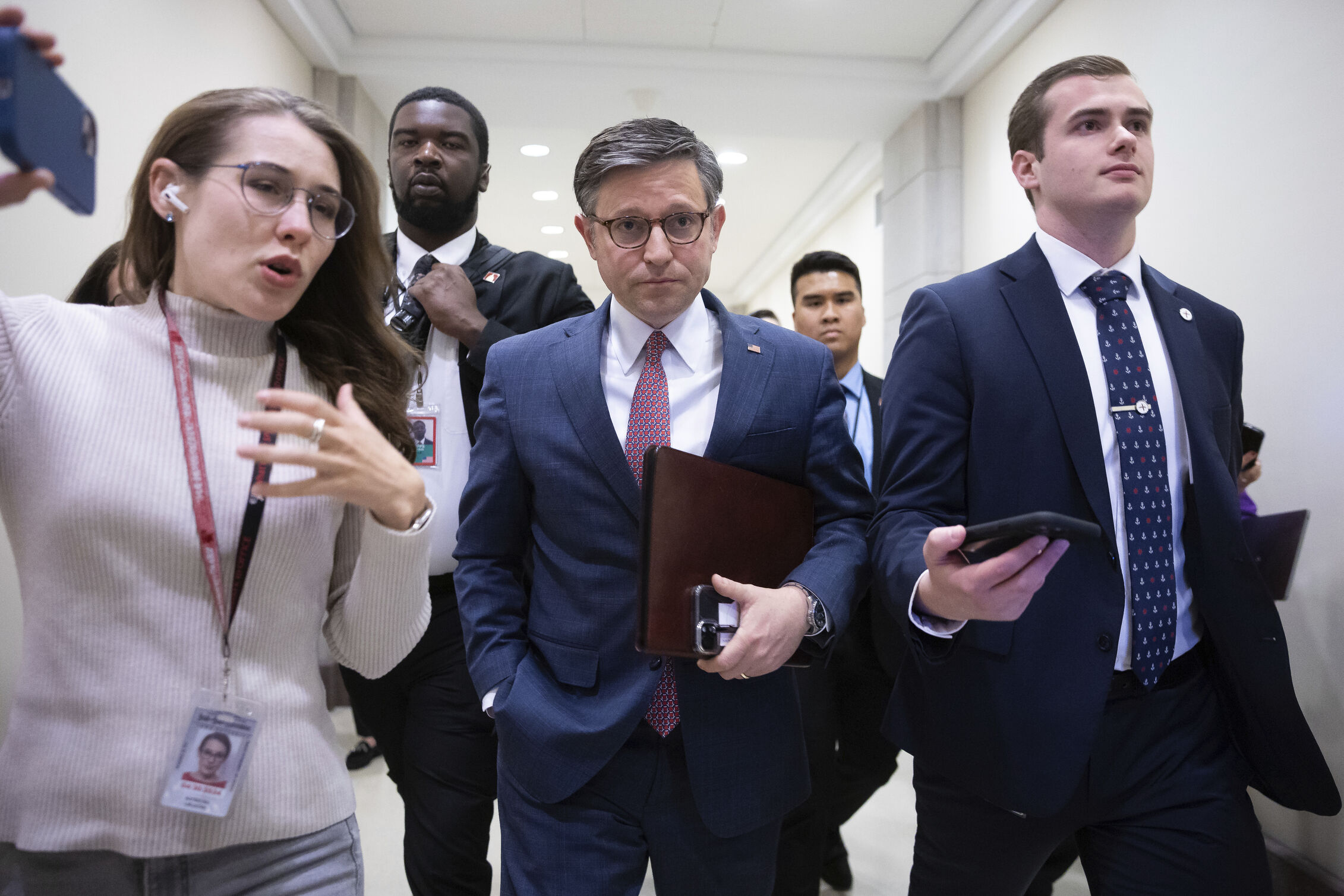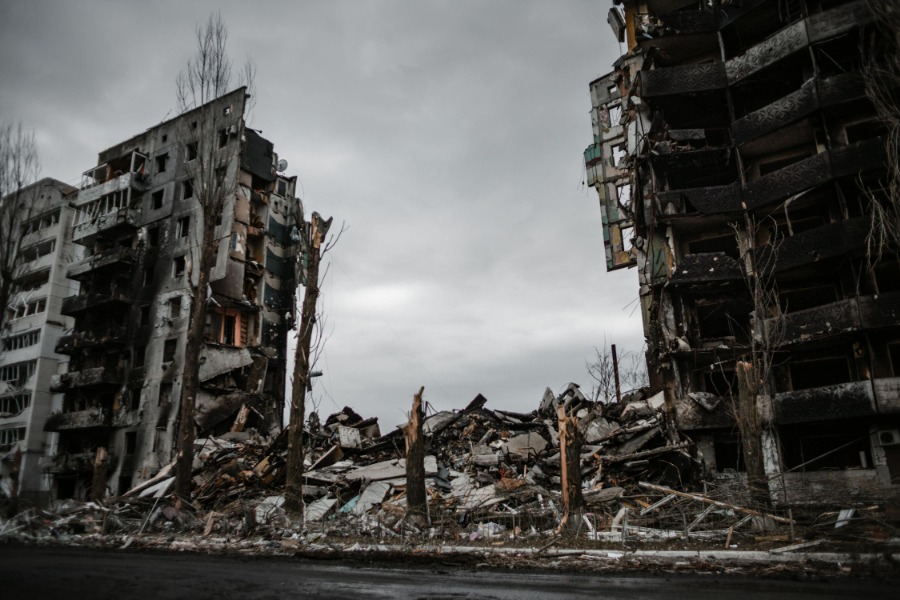The War Over Ukraine—On Wikipedia
The country’s future as an independent nation is fought for not just on physical battlefields but on virtual ones as well.

Published by The Lawfare Institute
in Cooperation With

On April 13, I found myself sitting in my hotel room in Lviv, Ukraine, listening to air raid alarms go off as I fought on a front of my own in the Ukrainian war against Russia.
My front was Wikipedia.
Specifically, I was battling over the proper national identifier for a man named Kazimir Malevich, a self-described Ukrainian avant-garde artist born in Kyiv to a Polish father and Ukrainian mother. Even though Malevich (1879-1935) directly tied his own artistic development to his Ukrainian history in diary entries, many of the world’s museums today nonetheless label the artist as “Russian, Ukraine-born.”
My engagement with Malevich’s Wikipedia page began two days early, on April 11, when the Shadows Project, an organization I co-founded in 2021, posted a requeston Instagram asking museums around the world, including the Museum of Modern Art in New York, to update Malevich’s labels to accurately reflect his Ukrainian identity. Our post on Shadows got quite a lot of attention, garnering more than 6,000 shares and more than 22,500 interactions. Not long after the post went up, we received a DM from one of our followers; “Malevich’s Wikipedia page says he’s Russian,” it read. I sighed, and went to check.
Upon first look, Malevich’s Wikipedia page seemed to say that he was a Ukrainian artist. It must’ve been updated, I thought to myself. But a few minutes later, I went back to look again. As I sat in Lviv, refreshing the Wikipedia page for Malevich every few minutes, I realized that I was watching the Russian information war in real time:
April 16, 12:13. “Kazimir Severinovich Malevich … was Ukrainian and Soviet avant-garde artist and art theorist …”
.png?sfvrsn=157836ac_3)
Screenshot of Kazimir Malevich's Wikipedia page on April, 16, 12:13.
Click. Click. Refresh.
April 16, 13:16. “Kazimir Severinovich Malevich … was Russian and Soviet avant-garde artist and art theorist …”
.png?sfvrsn=74ca9da0_3)
Screenshot of Kazimir Malevich's Wikipedia page on April, 16, 13:16.
Click. Refresh.
April 16, 16:21. “Kazimir Severinovich Malevich … was Ukrainian avant-garde artist and art theorist …”
.png?sfvrsn=efa41158_3)
Screenshot of Kazimir Malevich's Wikipedia page on April, 16, 16:21.
Click. Click. Refresh.
April 16, 18:42. “Kazimir Severinovich Malevich … was Russian avant-garde artist and art theorist …”.png?sfvrsn=ead31ab0_3)
Screenshot of Kazimir Malevich's Wikipedia page on April, 16, 18:42.
This isn’t just a trivial semantic back-and-forth, but an effort to erase the very existence of Ukraine. Russia’s efforts to subvert and destroy the Ukrainian identity are far from a new phenomenon. Denying Ukraine’s separate and distinct culture stems from as far back as Imperial Russia, when the Valuev Circular, a secret imperial decree from 1863, declared that a separate Ukrainian language “has never existed, does not exist, and cannot exist.”
Denying Ukrainian nationality, and the consequent forceful erasure of Ukrainian culture, has been a significant policy concernfor the Kremlin since the days of the Russian Empire. And while Western countries have been working with Ukrainians to provide ammunition, drones, tanks and more—they have yet to match Russia’s cultural cannonry.
For many observers in the West, Putin’s Feb. 21 speech, in which he claimed Ukraine was a state created by Lenin, was their first interaction with Russia’s revisionist history with respect to Ukraine. Newspapers and Western academics were shocked—calling his monologue “surreal,” “strange”—and were quick to dismiss it as an “angry” and “bitter” tirade. But Putin’s erasure of Ukraine’s history is not just the rambling of a washed-up old dictator, and dismissing it as such is dangerous. Historical revisionism is actually one of the Kremlin’s most powerful weapons.
As I write this piece, a debate is taking place about whether Russia is engaged in genocide within the meaning of the Genocide Convention, which defines genocide as any of several types of atrocity when “committed with intent to destroy, in whole or in part, a national, ethnical, racial or religious group, as such.” Obviously, it is not itself genocide to send an army of trolls to edit Ukraine out of Wikipedia. But consider for a moment that this activity is taking place concurrent with mass killings, deportations of children and the deliberate destruction of cities. While it is not violent activity in and of itself, it is some of the most compelling evidence there is that Russia and its proxies are acting “with intent to destroy [the Ukrainian] national [group] as such.” As you read the following, keep in mind that the slaughter at Bucha and Mariupol were taking place even as I was fighting with some anonymous troll over whether Malevich was Ukrainian or not.
For most of its history, Russia has been able to control the access to and flow of information about history because of the centralized nature of the Russian state and Russia’s physical control over the landmass of Ukraine. During the Soviet Union era, access to the outside world and to archives and information about what was happening inside the country was severely restricted. The central government had broad control over the historical narrative, and thanks to this, the Soviet government was able to rewrite or modify, or in some cases just erase, much of Ukraine’s history.
Ukraine’s independence in 1991 and the collapse of the Soviet Union, combined with the rise of the digital age and the internet era, however, meant that free access to information about Ukraine and its history was suddenly available as never before. And this has been both a blessing and a curse in Ukraine’s fight for independence.
On one hand, since the fall of the Soviet Union, Ukrainians are able to have open discussions about their past, their culture, their identity, and the crimes committed against them by the past Russian governments. On the other hand—because Russia has controlled the flow of information for so long, even in the internet age—Ukrainians are battling upstream in order to correct and untangle centuries of imperial narratives.
Consider Wikipedia.
Malevich’s page is not the only page being vandalized by trolls, but it is a particularly striking and prominent example. As I sat there refreshing the page, I watched pro-Russian accounts literally wipe away every mention of Ukraine from Malevich’s biography.
This was what the Wikipedia page looked like on April 9 at 22:30:
.png?sfvrsn=2ef954c1_3)
Screenshot of Kazimir Malevich's Wikipedia page on April 9 at 22:30.
This is what it looked like on April 11 at 13:16:
.png?sfvrsn=c3de76dd_3)
Screenshot of Kazimir Malevich's Wikipedia page on April 11 at 13:16.
The “Ukrainian avant-garde” had become the “Russian avant-garde.” “Ukrainian-born” had become “Russian-born,” and “Ukraine” had become the “Russian Empire.” Every single mention of Ukraine had been systematically wiped off the page.
If you think that this erasure of Ukrainian identity on Wikipedia is a recent phenomenon, think again. A simple dive through the “edit history” of famous cultural figures tells you all you need to know.
Here is one of the earliest versions of composer Pyotr Ilich Tchaikovsky’s Wikipedia page, from 2003:
.png?sfvrsn=6eb072f9_3)
Screenshot of Pytor Illich Tchaikovsky's Wikipedia page from 2003.
As the entry reflected as of December 2, 2003, Tchaikovsky’s father was Ukrainian, his mother, French. Later versions of his page (April, 2004) were updated as follows:
.png?sfvrsn=14a98a62_3)
Screenshot of Pytor Illich Tchaikovsky's Wikipedia page from 2004.
On November 24, 2005, the page was updated to erase his father’s Ukrainian heritage, keeping the mention of his mother’s French roots:
.png?sfvrsn=ef1f234f_3)
Screenshot of the edit history of Pytor Illich Tchaikovsky's page, November 24th 2004 at 7:00 vs. 7:04.
According to my research—it took three years until this edit would be reverted and Tchaikovsky’s father was recognized as Ukrainian once again. Tracking the edits of Tchaikovsky’s page throughout the years, I saw the recognition of his Ukrainian side swing back and forth. Notably, however, I found no instance in which whoever was eliminating the composer’s Ukrainian heritage also removed mention of his mother’s French roots.
These changes were sometimes explicitly political. On December 12, 2020, for example, there was a section of Tchaikovsky’s Wikipedia page dedicated to his Ukrainian roots and the time he spent in Ukraine:
.png?sfvrsn=8ce8a9a9_3)
Screenshot of the edit history of Pytor Illich Tchaikovsky's page, December 12, 2020.
On December 14, 2020, a user removed this entire section, leaving an edit comment stating, “delete fake. The USSR created Ukraine.” Sound familiar? This idea that Lenin created Ukraine did not originate with Putin’s February speech.
The section about Tchaikovsky’s relationship to Ukraine and his time spent there no longer exists on his Wikipedia page. The only mention of Ukraine on the composer’s page is a statement that his great-grandfather was born there; there is no mention of the composer’s multiple summers spent in the country at his family’s home in Ukraine, nor of the deep influence that Ukraine had on several of his works. Now, to be sure, Tchaikovsky wasborn in Russia, but his Ukrainian Cossack roots are an influence in his musicand a large part of his life, and these have just disappeared—or, rather, they have been made to disappear—from Wikipedia.
Or take, for another example, David Burliuk’s page. Burliuk (1882-1967) was another Ukrainian avant-garde artist. His nationality, like Malevich’s, has been subject to constant attacks by trolls pushing Russian narratives. But in Burliuk’s case, the trolls went a step further.
Here’s what Burliuk’s page looked like as of April 16 at 00:15:
.png?sfvrsn=95467ea5_3)
Screenshot of David Burliuk's Wikipedia page on April 16, 2022 at 00:15.
Burliuk’s national identity had already been modified to say Russian. But that’s not what the trolls were after. About 15 minutes later, the page looked like this:
.png?sfvrsn=a816865b_3)
Screenshot of David Burliuk's Wikipedia page on April 16, 2022.
The editor removed the Ukrainian-language spelling of Burliuk’s name and commented—“no point duplicating the Russian spelling and pretending it’s a distinct language.” The point here was not merely to edit Burliuk’s identity but to edit out the existence of the Ukrainian language and the Ukrainian spelling of Burliuk’s name on the theory that Russian and Ukrainian are the same language and therefore should not be mentioned separately.
The Wikipedia trolls are not above blatantly lying, either. For example, this is what the Wikipedia page of Vladimir Tatlin, a Ukrainian and Soviet painter, architect and stage designer, looked like as of April 17, 2020:
.png?sfvrsn=fd205aa3_3)
Screenshot of the edit history of Vladimir Tatlin's Wikipedia page on April 17, 2020.
It correctly stated that Tatlin was born in Kharkiv, present-day Ukraine. A few days later, on April 20, 2020, his page stated that Tatlin was born in Moscow:
.png?sfvrsn=4412632b_3)
Screenshot of the edit history of Vladimir Tatlin's Wikipedia page on April 20, 2020.
This, perhaps, is one of the most direct erasures I’ve found thus far. It’s a step further from simply obscuring any mentions of Ukraine—it’s a blatant falsehood. According to Encyclopedia Britannicaand “Constructivism in Russia: 1920-23” by Monoskop, Tatlin was born in Kharkiv, present-day Ukraine.
This is not the first time that Ukrainians have had to wage war on Russian disinformation campaigns on Wikipedia. One of the most public Wikipedia edit warsof all time is the battle over the spelling of Kyiv—Is it Kyiv, or Kiev? This may seem like a trivial matter of vowel placement to a lot of Westerners, but the two names sound quite different to native ears. Kyiv is the spelling of the city transliterated from its Ukrainian name, while Kiev is transliterated from the city’s Russian name. As Ukrainian is the country’s official language and Kyiv is a Ukrainian city, the appropriate and correct spelling is Kyiv—but because of centuries of imperial rule, Kiev—the city’s Russified name—is still widely used.
Wikipedia’s Battle of Kyiv began in 2003, 12 years after Ukraine officially became independent, and two years after the website began. Editors began to changethe Russified version of Kiev into the official Ukrainian spelling of Kyiv. The battle has raged for nearly two decades since. However, after the first Russian invasion in 2014, more and more Western media began to switch over to Kyiv as a sign of respect for Ukraine’s autonomy, and the Ukrainian government launched the #KyivNotKiev campaign to raise awareness of the issue. By September 2020, English Wikipedia officially adoptedthe Ukrainian spelling of “Kyiv”— but even though that is the “official” line, to this day, rogue pro-Russian editors still modify the spelling of the city’s name.
Why do these Wikipedia wars matter? For one thing, they matter enough to Russian-sympathetic trolls that they spend time and energy modifying thousands of articles. But they also matter because Wikipedia is one of the leading informational authorities on the internet; millions and millions of users scroll through Wikipedia each day and it’s a website that’s become incredibly trustedamong users. So, the edit wars aren’t just minor quibbles but, instead, are a part of a dangerous game. The information seen on Wikipedia shapes people’s perceptions of the truth.
I’ve battled with this reality firsthand. When attempting to contact museums asking them to relabel Malevich from a Russian to a Ukrainian artist, I often received responses that specifically referenced the way Malevich’s nationality is described on Wikipedia to defend their labeling. All roads lead back to Wikipedia. And if Wikipedia is wrong—and not just wrong but wrong for political reasons—and if Russia is committing time and energy to making sure Wikipedia is wrong, what then?
Since the 2022 Russian invasion of Ukraine, interest in the country and its history has spiked to unprecedented levels. In February 2021, the number of people reading about Ukraine on English Wikipedia was roughly 290,000. In 2022, that number went up to more than 22 millionpage views.That’s millions of people who may be encountering Ukrainian history and culture for the first time, and the information they see on Wikipedia has incredible power to mold their perceptions and opinions about the country.
This is exactly what Russian-sympathetic accounts try to influence on Wikipedia, with thousands of pro-Russian bots and users conducting guerilla-like campaigns to infiltrate any corner of the web where users may be encountering, and forming opinions about, Ukraine. It affects cultural figures, artists, authors and many others.
And it’s not just Wikipedia. Since 2014, “de-Ukrainianization” had already begun to be officially implementedas policy in Russian schools. After the invasion of 2014, Russian textbook editors were instructedto mention Ukraine as rarely as possible in their textbooks. After Feb. 24, they were again given verbal orders to minimize all references to Ukraine and Kyiv. Textbook editors reportedhaving to rewrite about 15 percent of the texts. One of the textbook editors reports being tasked with making it seem as though Ukraine “simply does not exist.”
As French historian Ernest Renan once said, “forgetfulness” is “an essential factor in the creation of a nation.” No nation knows this better than Russia. Russian elites have historically built their nation on the backs of their colonies, and now, with these colonies having achieved independence, many of the staples of Russian national “identity” reside outside of Russia’s geographic borders.
This causes a paradox for the Russian nation that requires a strategic forgetfulness to consolidate; the country’s conception of its own historical borders, which sees the modern Russian nation as a descendant of the Kyivan Rus’, does not coincide with the country’s actual territorial borders. It is an inconvenient fact for this worldview that Kyiv, the “mother of all Russian cities,” is not Russian. How do you reconcile this inconsistency in your national narrative? According to Putin, you resolve your cognitive dissonance by force on the ground and by loosing trolls on the internet.
In other words, the seemingly petty Wikipedia edit wars are actually an important battleground, and unfortunately, they are a battleground on which Russian narratives are much more successful compared to how Russian soldiers have fared on the ground in physical battle against the army of a nation Russians pretend does not exist.
These efforts at historical revisionism persuade a lot of people who should know better. On April 26, in an exchange with Secretary of State Antony Blinken, Sen. Rand Paul said, “You could also argue the countries [Russia has] attacked were part of Russia.” Consider the import of that comment: A U.S. senator suggested that the U.S. ought not to come to Ukraine’s defense because Ukraine is really a part of Russia. This is Russia’s centuries-long misinformation campaign to distort Ukraine’s historical sovereignty playing out with tangible consequences. Paul corrected himself later to say the Soviet Union, but the Freudian slip is telling, and it captures exactly why historical memory is a battle that will continue long after the current war is over.
And so, any comprehensive national security strategy for Ukraine must take into account cultural and informational security.
Defending Ukraine’s sovereignty means defending sovereignty in every sense of the word—not only Ukraine’s territorial sovereignty but also its control over its own culture and history. Content moderation presents its own host of challenges, but Wikipedia could perhaps help by closely monitoring and restricting any edits on its pages that include the removal of the words “Ukraine” and “Ukrainian,” with particular scrutiny in cases where these words are replaced by “Russia” or “Russian.”
I don’t know whether a falling tree makes a sound if no one hears it, but I do know that it makes it very hard for Ukraine to exist if people don’t believe it exists. The country’s future as an independent nation is fought for not just on physical battlefields but on virtual ones as well.





